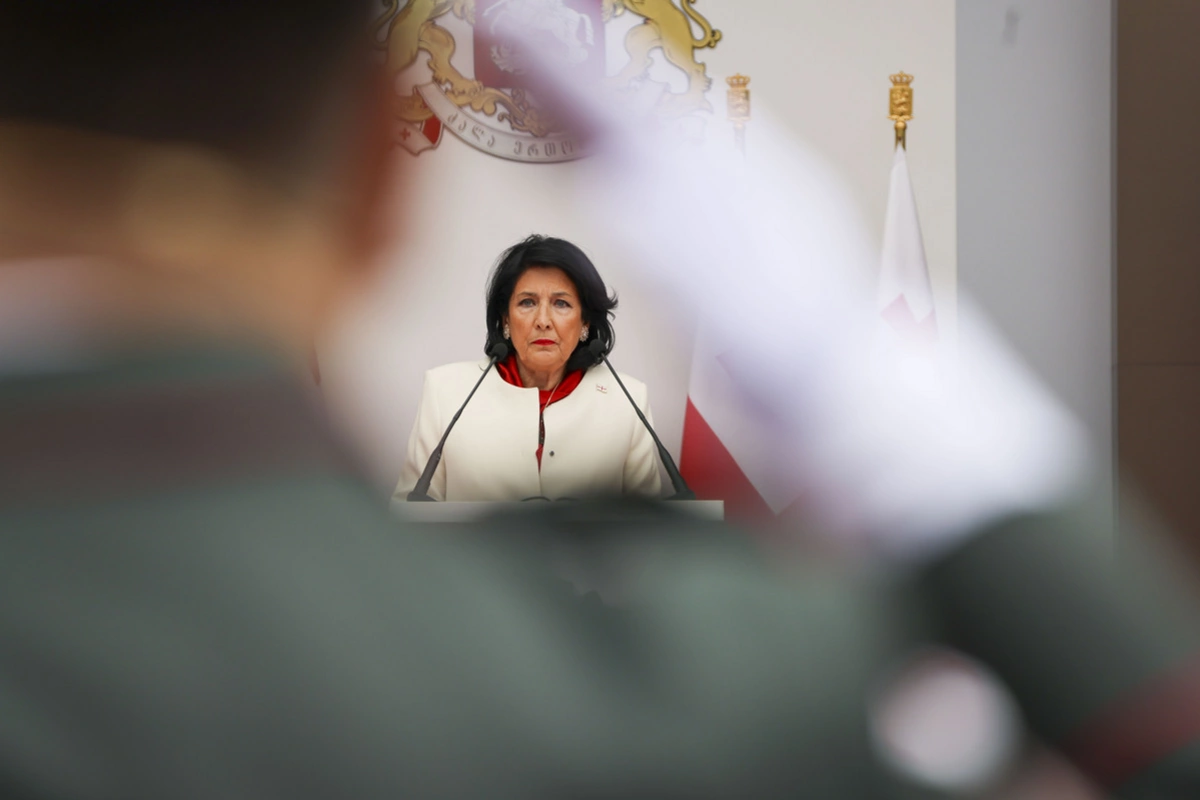
Georgian lawmakers have overturned President Salome Zurabishvili’s 28 May of the controversial “foreign agent” law.
President Salome Zurabishvili delivers a speech on Georgia's Independence Day in Tbilisi on May 26. Image: president.ge
(RFE/RL) TBILISI -- Georgia's so-called "foreign agent" law is expected to land back on President Salome Zurabishvili's desk after lawmakers on May 28 overrode her veto, prompting fresh protests against the piece of legislation seen as mirroring a repressive Russian measure and jeopardizing the country's drive toward the European Union.
The ruling Georgian Dream party, as expected, pushed through the override on May 28 with an 84-4 vote in the 150-seat parliament. A simple majority of 76 votes was needed to cancel Zurabishvili's veto.
Most opposition deputies had walked out of the chamber ahead of the vote.
Angry Protests in Tbilisi as Parliament Rejects Veto On 'Foreign Agent' Bill
Zurabishvili, who has been at odds with Georgian Dream over the bill and sided with the pro-Western protesters, now has five days to sign the measure into law. She has given no indication she intends to do so but if she refuses, the speaker of parliament, Georgian Dream member Shalva Papuashvili, can sign the law and publish it.
The vote to override Zurabishvili's veto came despite last-minute appeals from the European Union and several member states to Georgian lawmakers as hundreds of mostly young protesters chanted "No Russian law!" and "Slaves!" while waving Georgian and EU flags.
Zurabishvili addressed the crowd massed peacefully at the back entrance of the legislature via video link, urging them not to let the 84 lawmakers who voted for bill have the final say.
The 84 deputies who voted for the law are "nobody compared to those who are here today -- the new Georgia, the Georgia of the future," she said, encouraging demonstrators to save their anger and energy for national elections in October.
Georgia's civil society has for years sought to move the country away from the influence of Russia, which still maintains thousands of troops in South Ossetia and Abkhazia, two breakaway Georgian regions that Moscow recognized as independent states following a five-day war with Tbilisi in 2008.
Critics say the legislation was introduced by Georgian Dream, founded by Russian-friendly Georgian tycoon Bidzina Ivanishvili, in order to cement the party's grip on power ahead of elections later this year seen as crucial for Georgia's Euro-Atlantic path.
Both the United States and the European Union have warned Georgian Dream that ignoring criticism and cracking down violently on protesters will have negative consequences.
Georgia obtained the coveted status of EU candidate country in December, but it has yet to start actual accession talks, which could last for years. There had been hope such talks could start later this year, but Brussels has warned that the "foreign agent" law could endanger the path toward Europe.
Georgian Dream has insisted that it remains committed to joining Western institutions and the law was only meant to increase transparency on NGO funding.
But European Council President Charles Michel warned on May 28 that overriding Zurabishvili's veto was a "step backward" for Georgia's European aspirations.
"The European Council decided in December to grant Georgia candidate status on the understanding that Georgia undertakes the relevant steps and necessary democratic reforms," Michel wrote on X, formerly Twitter.
"The adoption of the transparency law in the parliament is a step backward and takes Georgia further away from its EU path. The Georgian people have clearly chosen a future in the EU and we will do everything to support their ambitions," Michel said, adding that the issue will be on the agenda of the next European Council meeting.
A day before the vote, EU foreign policy chief Josep Borrell said the bloc had started weighing options should Georgia enact the law. He said a decision will be made next month.
After the Georgian Dream party pushed the bill through, a State Department spokesman said the United States condemns the parliament's decision and told reporters that the party's actions and anti-Western rhetoric threaten Georgia's democratic trajectory.
Senator Ben Cardin (Democrat-Maryland), chairman of the influential Senate Foreign Relations Committee, said the Georgian Dream vote was a "sad day for Georgia," and reaffirmed Washington's determination to back the aspirations of the Georgian people.
"The people have demonstrated that they will not allow Ivanishvili to destroy their democracy & take away their European future. We stand with them," Cardin said on X.
Zurabishvili, meanwhile, has urged Georgians to gear up for the upcoming parliamentary elections later this year.
"We must now do everything we can to prepare for October 26, which will be our answer to today. Are you angry today? Get angry, but let's get down to business," she said, calling for a campaign to collect signatures for an EU referendum.
The law requires civil society and media organizations that receive more than 20 percent of funding from foreign sources to submit to oversight that could encompass sanctions for as-yet-undefined criminal offenses.
Share on social media